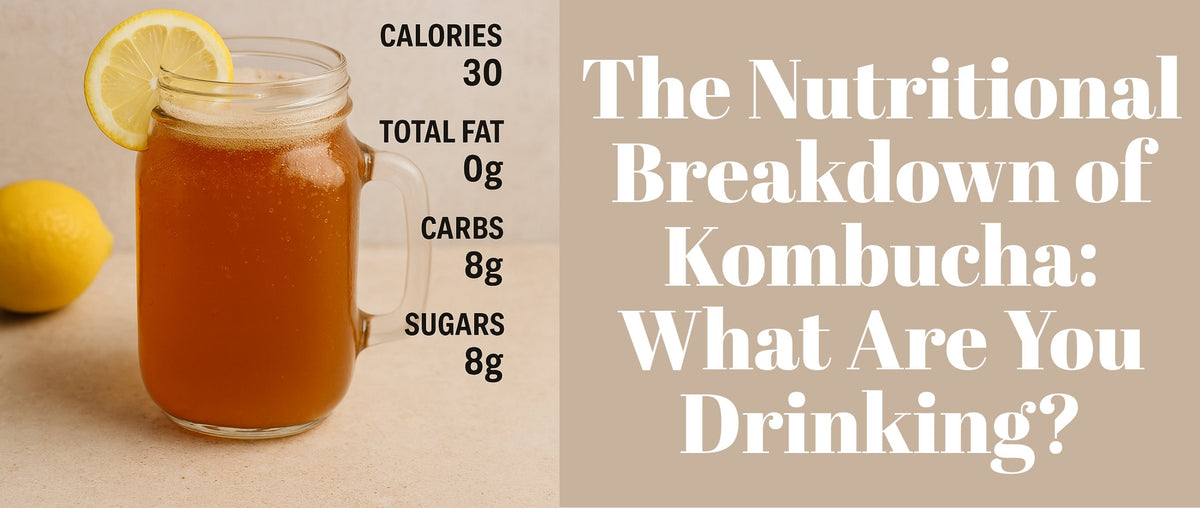Kombucha vs. Probiotic Supplements: Which is Better?
Maintaining a healthy gut is crucial for overall well-being. Probiotics, which are beneficial bacteria, play a key role in digestion, immune function, and even mental health. Two popular sources of probiotics are kombucha and probiotic supplements, each offering unique benefits.
For those following a vegan diet, consuming healthy drinks like kombucha has become a common way to support gut health. But is kombucha truly better than probiotic supplements? Or do supplements provide a more effective and consistent source of probiotics?
This article provides a detailed comparison between kombucha and probiotic supplements, examining their nutritional benefits, effectiveness, potential risks, and cost considerations to help you make the best choice for your health.
What is Kombucha?
Kombucha is a fermented tea that has been consumed for centuries for its potential health benefits. It is made by fermenting black or green tea with a symbiotic culture of bacteria and yeast (SCOBY). The fermentation process produces a tangy, fizzy drink that contains probiotics, organic acids, vitamins, and antioxidants.
Health Benefits of Kombucha
- Rich in Probiotics: Naturally contains beneficial bacteria that support digestive health.
- Supports the Immune System: The antioxidants and organic acids in kombucha help reduce inflammation.
- Detoxifies the Body: Contains glucuronic acid, which helps eliminate toxins.
- May Support Weight Loss: Some studies suggest that kombucha's acetic acid content helps regulate metabolism.
Kombucha and the Vegan Diet
Kombucha is a great addition to a vegan diet because it provides probiotics without dairy, unlike yogurt or traditional probiotic drinks. Many people also combine kombucha with plant-based cheese, such as vegan mozzarella cheese blocks, to enjoy a balanced snack rich in both probiotics and proteins.

What are Probiotic Supplements?
Probiotic supplements are concentrated forms of beneficial bacteria available in capsules, powders, and gummies. They contain specific strains of probiotics that are scientifically studied for gut health benefits.
Types of Probiotic Supplements
- Single-strain probiotics – Contain one type of beneficial bacteria, such as Lactobacillus or Bifidobacterium.
- Multi-strain probiotics – Offer a combination of different probiotic strains for diverse benefits.
- Synbiotics – Combine probiotics with prebiotics, which are fibers that feed beneficial bacteria.
Benefits of Probiotic Supplements
- Standardized Probiotic Content: Unlike kombucha, which may have inconsistent probiotic levels, supplements contain a precise amount of probiotics.
- No Sugar or Calories: Many commercial kombuchas contain added sugar, while probiotic supplements are sugar-free.
- Longer Shelf Life: Unlike kombucha, which requires refrigeration, supplements are stable at room temperature.
How Supplements Fit into a Vegan Lifestyle
For those following a vegan diet, choosing probiotic supplements that are dairy-free and gelatin-free is important. Many supplement brands now offer vegan-friendly probiotic options, making them a convenient choice for maintaining gut health while consuming other vegan products like oat milk and cashew butter.
Kombucha vs. Probiotic Supplements: A Detailed Comparison
To determine which is better, kombucha or probiotic supplements, we need to analyze several factors, including probiotic content, nutritional value, convenience, and cost-effectiveness.
1. Probiotic Content: Which One Provides More Beneficial Bacteria?
| Factor | Kombucha | Probiotic Supplements |
|---|---|---|
| Probiotic Variety | Contains a mix of bacteria and yeasts, but strains vary depending on fermentation. | Specifically formulated with known probiotic strains like Lactobacillus and Bifidobacterium. |
| Potency | Probiotic levels can fluctuate due to storage, brewing, and time. | More reliable with guaranteed potency (CFU count). |
| Effectiveness | Some probiotics in kombucha may not survive stomach acid. | Designed for maximum gut absorption. |
💡 Verdict: If you need consistent, scientifically proven probiotics, probiotic supplements are the better option. However, if you prefer a natural source of probiotics with added nutrients, kombucha is a great choice.
2. Nutritional Comparison: More Than Just Probiotics
| Nutrient | Kombucha | Probiotic Supplements |
|---|---|---|
| Probiotics | Naturally occurring but varies in strain and quantity. | High concentration of selected probiotic strains. |
| Sugar Content | May contain added sugars (especially flavored kombuchas). | Typically sugar-free. |
| Calories | Can range from 30–80 kcal per bottle. | Zero calories in most probiotic capsules. |
| Additional Nutrients | Contains B vitamins, antioxidants, and organic acids. | Usually only probiotics unless fortified. |
Verdict: If you’re looking for low-calorie, sugar-free options, probiotic supplements are better. But if you want additional benefits like antioxidants and vitamins, kombucha is a great choice.
3. Digestibility & Gut Health Benefits
- Kombucha is easier to digest because it comes in liquid form, but its probiotic strains are unpredictable.
- Probiotic supplements are formulated for digestive health, often including prebiotics to improve gut bacteria growth.
Those consuming kombucha in India should also check for added apple cider vinegar drink elements, which can further boost gut health.
4. Safety & Side Effects
| Factor | Kombucha | Probiotic Supplements |
|---|---|---|
| Potential Risks | May contain alcohol from fermentation, unpasteurized variants can harbor harmful bacteria. | Some individuals experience bloating or gas initially. |
| Allergen Considerations | Can be contaminated with yeast or bacteria if home-brewed. | Usually safe, but some may contain traces of dairy. |
💡 Verdict: Probiotic supplements are a safer option for individuals with sensitive stomachs or those concerned about alcohol in kombucha.
5. Cost & Accessibility
| Factor | Kombucha | Probiotic Supplements |
|---|---|---|
| Price | $3–$5 per bottle (or more for premium brands). | $20–$50 per month, depending on quality. |
| Shelf Life | Must be refrigerated and consumed quickly. | Long shelf life, no refrigeration needed. |
| Availability | Widely available but more expensive in some regions. | Available in pharmacies, health stores, and online. |
💡 Verdict: Probiotic supplements are more affordable long-term and require less maintenance than kombucha. However, those who enjoy the taste and experience of kombucha may find it worth the price.
Factors to Consider When Choosing Between Kombucha and Probiotic Supplements
The choice between kombucha and probiotic supplements depends on various factors, including lifestyle, health goals, and personal preferences.
1. Dietary Preferences and Restrictions
- Kombucha is a fermented drink that may contain traces of alcohol and sugar, making it unsuitable for those avoiding sugar or alcohol.
- Probiotic supplements are usually gluten-free, dairy-free, and sugar-free, making them more suitable for individuals following strict diets like a vegan diet or those looking for cholesterol-free foods.
2. Health Goals and Gut Health Needs
- If the goal is overall digestive health, a high-quality probiotic supplement ensures a steady supply of beneficial bacteria.
- If additional antioxidants and nutrients are needed, kombucha provides vitamins and organic acids that support detoxification.
- For those consuming vegan cheese alternatives like plant-based cheese, kombucha may complement meals well by aiding digestion.
3. Convenience and Cost Considerations
- Kombucha requires refrigeration and has a short shelf life, whereas probiotic supplements are easy to store and travel with.
- In terms of cost, kombucha is more expensive per serving compared to probiotic supplements, which provide a higher CFU count per dose.
Expert Opinions and Scientific Research
Recent studies suggest that probiotic supplements are more efficient in delivering targeted strains of beneficial bacteria to the gut. However, kombucha offers additional nutrients and a refreshing beverage option that contributes to a well-rounded healthy drinks routine.
For those transitioning to dairy-free diets, pairing probiotic supplements with vegan products like oat milk, vegan butter, and cashew butter ensures a balanced intake of gut-friendly nutrients.
Conclusion: Which is Better?
Both kombucha and probiotic supplements have their strengths and are beneficial for gut health.
- Choose kombucha if you prefer a natural, fermented drink with additional antioxidants and are looking for a refreshing way to consume probiotics.
- Choose probiotic supplements if you need a consistent, potent, and sugar-free source of beneficial bacteria, especially when following a vegan diet or avoiding fermented foods.
For individuals looking to improve gut health while maintaining a cholesterol-free, plant-based lifestyle, combining probiotic supplements with healthy dietary choices such as unprocessed cheese, fresh mozzarella, fat-free butter, and garlic butter can be a great option.
In the end, the best choice depends on individual needs. Consulting a healthcare provider can help determine the most effective probiotic source for your body.
Do you enjoy vegan food? We have a list of vegan restaurants in India to help you find delicious options in your area!










